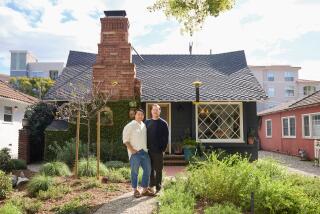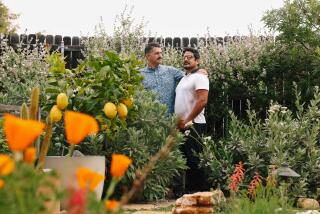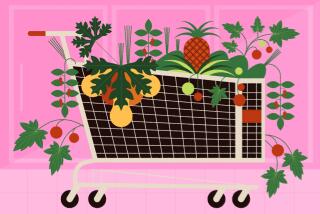Market Watch: An urban farmer’s passion blooms again
When Tara Kolla of Silver Lake Farms returned to the Hollywood farmers market last Sunday for the first time in three years, her flower stand was a riot of color, with sweet peas, ranunculus and snapdragons, and her customers were rapturous, but her eyes were rimmed with tears.
“I’ve come a long way, and it cost me much in the journey,” she said.
Kolla started with a dream — a flower farm based in her Silver Lake backyard — then was forced by city authorities to close down, due to a quirk in the municipal code. But she dug in her heels, fought City Hall and won, thereby providing a clear legal foundation for other growers in residential areas in the city of Los Angeles.
Her case stemmed specifically from a neighbor who objected to her business, but urban farming is a hot trend, and there are plenty of others who could have faced similar difficulties had she not succeeded in changing the law.
Soon after buying a home in Silver Lake in 2001, Kolla decided to farm her half-acre backyard and started growing flowers alongside the usual assortment of fruit trees. “It just seemed to be the most sensible way to cover the cost of maintaining that huge property, to grow something that I could sell,” she said on a recent visit.
Since she knew little about horticulture, she took classes at Pierce College in soil science, botany and landscape design. After testing flowers in her yard, in 2004 she started selling at farmers markets in Silver Lake, then Atwater Village, Echo Park and Hollywood. She also raised vegetable seedlings, which she planted and maintained in clients’ gardens.
Kolla takes particular pride in nourishing soil rich in beneficial microorganisms, using teas brewed from organic compost on her property, so that her plants remain healthy without the use of pesticides.
“Most people don’t realize that commercial flowers are covered in pesticides,” she said. “There are many local farmers doing an amazing job of growing food organically but very few growing flowers.”
So that became her niche, although she did not become certified as an organic farmer, regarding her growing practices as “beyond organic.”
All went well until 2009, when a neighbor, a lawyer with whom Kolla had had a minor disagreement, complained to the City of Los Angeles Department of Building and Safety that she was illegally growing flowers on her property for sale off-site. The existing truck-gardening ordinance, part of the residential zoning code, stated that it was permissible to grow vegetables on residential property for sale off-site but did not mention flowers or fruits.
The city authorities agreed with the neighbor and in spring 2009, right at the peak of Kolla’s harvest, ordered her to stop farming. Disconsolate, she gave away all her flowers.
To make ends meet, she started a community-supported agriculture program, drawing produce from selected local farms — often including unusual items like medlars — to sell to subscribers. She also stepped up her work gardening for clients, and gave lectures and workshops about urban farming, where she gained a reputation as a knowledgeable and impassioned speaker.
Kolla made many friends among the volunteers who came to learn at her workshops, and seven of them formed a group, Urban Farming Advocates, which approached Eric Garcetti, the City Council member for her district. He was sympathetic and agreed to sponsor the Food and Flowers Freedom Act, an ordinance amending the Los Angeles municipal code to clarify the farming uses permitted in each zone. It defined truck gardening as “the cultivation of berries, flowers, fruits, grains, herbs, mushrooms, nuts, ornamental plants, seedlings or vegetables for use on-site or sale or distribution off-site.”
“I authored the Food and Flowers Freedom Act to promote local growing by simply filling in a gap in our city laws, which addressed the growing of vegetables but not other items commonly sold at our local farmers markets,” Garcetti said.
Kolla’s supporters thronged a hearing about this proposed ordinance, the City Council voted unanimously to approve it and it took effect July 18, 2010. Kolla and other aspiring truck gardeners in Los Angeles were free to farm.
It took her almost two years to restart production, however, partly because of setbacks such as damage to her nursery area caused by huge trees that fell in a windstorm last December and uprooting of her beds by roving dogs.
Most of her flowers come from a growing grounds in Glassell Park, on about 7,000 square feet made available by the friend of a client. It’s a glorious site, a lush oasis on flat land secluded in the hills, with a view on one side stretching for miles, and hawks soaring overhead on thermal breezes. The clay soil was very hard-packed and thus difficult to prepare for farming, but the carefully tended beds are finally starting to produce.
Kolla has one employee, but much of the work is done by two “WWOOFers,” volunteers who signed up through the WWOOF (World Wide Opportunities on Organic Farms) network. They are attracted because of her expertise and charisma, and stay because they believe in her work.
Before her recent travails, Kolla took a circuitous path to farming. She was born in Inglewood to an English mother, who worked for a chainsaw company, and a father of South Indian origin, a computer specialist. Her parents split up when she was 12, and she and her mother moved to England, where she lived for 15 years. She studied modern languages and information systems at a university, opened up a clothing store, and then worked for American Express as a systems analyst. After being laid off in 1991, she moved back to Los Angeles and ran a boutique public relations firm for a decade before finding her passion as an urban flower farmer.
More to Read
Eat your way across L.A.
Get our weekly Tasting Notes newsletter for reviews, news and more.
You may occasionally receive promotional content from the Los Angeles Times.






